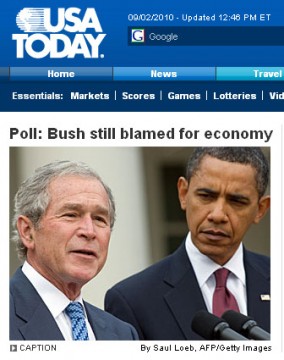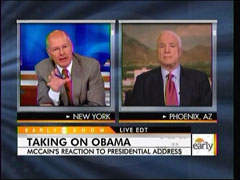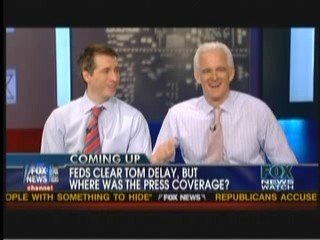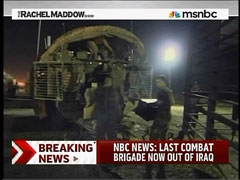White House press secretary Robert Gibbs made the rounds of the six broadcast and cable morning news shows on Tuesday morning to help set the table for the President’s speech marking the end of major combat operations in Iraq. Of the six network anchors Gibbs spoke with, only CBS’s Harry Smith failed to ask whether President Obama would extend credit to President Bush for the successful surge strategy (a strategy then-Senator Obama denigrated as futile). ABC’s George Stephanopoulos recited House GOP Leader John Boehner’s dig at politicians who “fought tooth-and-nail to stop the surge strategy,” and then rejected Gibbs claim that Boehner’s was “made up history.” NBC’s Matt Lauer recited Obama’s own words to Gibbs: “I am not persuaded that 20,000 additional troops in Iraq are gonna solve the sectarian violence there. In fact, I think it will do the reverse.” At each stop, Gibbs insisted that no one doubted the surge would improve security, but insisted that the real accomplishment was “an improved political situation.” CNN’s John Roberts followed up, asking whether security improvements credited to the surge were essential to those political improvements, but Gibbs dodged: “John, you asked me the same question I’m likely to give you the same answer.” When Gibbs reached Fox & Friends, co-host Gretchen Carlson was met with condescension and mockery when she asked the same question as the other hosts. “I think you’ve asked me this question twice and I’ve given you an answer,” Gibbs chided, dodging the question. Later: “That’s actually now the fourth time you’ve asked me that question….That’s number five….Gretchen, I don’t know whether this is you actually interviewing me or just a tape of you looping the same question over and over again.” Gibbs never directly stated whether or not the Bush administration deserves any credit for the (so far) positive outcome in Iraq. Only CBS’s Harry Smith — who last year voiced “regret” that he did not abuse his position as a newscaster to “stand up” and say of the Iraq war “this doesn’t make any sense” — refused to ask Gibbs about the surge. Instead, he suggested the seven year military commitment wasn’t worth it: HARRY SMITH: The President goes to Texas today to talk to veterans and soldiers. There are folks who have gone there on deployment after deployment after deployment, and some of them wonder this morning if their sacrifice has been worth it. Gibbs stubborn refusal to share any credit with the Bush administration — even going so far as to belittle a Fox News journalist — is baffling, since President Obama himself declared the surge to be a success in 2008. “I think that the surge has succeeded in ways that nobody anticipated,” Obama told Fox News host Bill O’Reilly. “It’s succeeded beyond our wildest dreams.” ( Video ) Here’s how Gibbs handled the five networks that posed questions about President Bush and the surge (thanks to MRC’s Geoff Dickens and Matthew Balan for help transcribing). They’re organized in roughly the order they took place, starting with the broadcast networks and then the three cable networks: # ABC’s Good Morning America: GEORGE STEPHANOPOULOS: For more on that speech, let’s turn now to Robert Gibbs, the White House press secretary. He joins us from the White House this morning. You know, Robert, already, the House Republican leader [John Boehner] has issued, I guess, a ‘pre-buttal’ of the President’s remarks in the speech he’s going to give today. He says this: ‘Some leaders who opposed, criticized, and fought tooth-and-nail to stop the surge strategy, now proudly claim credit for the results. Today, we mark not the defeat those voices anticipated, but progress.’ So he’s basically saying the milestone the President is marking today happened in spite of President Obama, not because of him. Your response? ROBERT GIBBS: Well, look, there’s a lot of made-up history in that statement. I think what Congressman Boehner — I think what the American people would like to know, with Congressman Boehner is, do you support withdrawing the 90,000-plus troops that this commander-in-chief is marking the milestone of today? There’s no doubt that were it not for a timeline for getting our combat troops out of Iraq, we’d still be there. First and foremost- STEPHANOPOULOS, interrupting: You say ‘made-up history,’ Robert, but- wait a second. You say ‘made-up history,’ but the President did oppose the surge. GIBBS The President did oppose the surge, George, but understand this: while the surge did provide some increased security in Iraq, what happened was a political transformation that took a long time after those added troops were put into Iraq. There was a Sunni awakening, where Sunni tribesmen decided they did not want to fight with, but against al Qaeda. STEPHANOPOULOS: But does credit also go to the surge? Does the President now believe that President Bush made the right decision to order that surge in troops in Iraq? GIBBS: Again, George, I think the President has always stated and always believed that our security would be- that adding 30,000 troops into Iraq would improve the security. But obviously, the leaders in Iraq had to make some political accommodation to move that country forward…. # NBC’s Today LAUER: You also mentioned at the White House the President would call President Bush in advance of his speech. Has the call taken place? GIBBS: I believe the call will take place a little bit later this morning, likely when the President is on Air Force One flying to thank our troops at Ft. Bliss right outside of El Paso, Texas. I think probably both commanders in chief share, share certainly one thing in common and that is thanking the men and women in uniform for the tremendous sacrifice that they made over the past seven-and-a-half years- LAUER: Right. GIBBS: -the thousands that aren’t coming back from Iraq, the tens of thousands that have been wounded but those that keep us safe and secure each and every day. LAUER: Let me read you something. In January of 2007 when President Bush announced the surge in Iraq, then Senator Barack Obama had this to say, quote, “I am not persuaded that 20,000 additional troops in Iraq are gonna solve the sectarian violence there. In fact, I think it will do the reverse.” So when President Obama speaks to former President Bush today, will he change his mind on that? Will he give President Bush credit for making that decision on the surge and admit that it contributed to the situation of more stability on the ground today? GIBBS: Matt, what is, what is certainly not up for question is that, that President Obama, then candidate Obama, said that adding those 20,000 troops into Iraq would, indeed, improve the security situation, and it did. What was necessary for this moment to happen was a diplomatic surge, a change in the Sunnis, the Sunni awakening, rather than fighting with al Qaeda they fought against al Qaeda. I think a number of things, most importantly our men and women in uniform, brought us to this point. LAUER: Right. GIBBS: I think there’s no doubt that the surge improved the security situation. But as this president said many times, the war in Iraq was not going to be fought or won primarily or just militarily. That we had to see some political accommodation and we had to see sectarian violence reduced because Sunni, Shia and Kurd decided to live together and chart Iraq’s future together, not fighting each other. LAUER: Alright Robert Gibbs at the White House. Robert, thank you so much. I appreciate it. # MSNBC’s Morning Joe MIKA BRZEZINSKI: Obviously the war was controversial, in the first few years, especially. The surge was controversial, for sure, and it generated and garnered a lot of criticism. Will the President be crediting the former president for his work there? ROBERT GIBBS: Well, look, I think the President will talk about the steps that our men and women in uniform took to make this day possible. There’s no doubt about it. I think, Mika, then-candidate Barack Obama said that adding 20,000 men and women into Baghdad and into Iraq was likely to improve the security situation…. # CNN’s American Morning JOHN ROBERTS: I know that the president is going to call former President Bush this morning. Will he tonight during his speech give credit to the president’s surge strategy for helping to better the security situation there so that the political process could proceed? GIBBS: Well, John, I don’t think there is any doubt. And you heard candidate Barack Obama say that adding 20,000 of our brave men and women who, quite frankly, John, I think we all share the belief that they are owed a tremendous amount of gratitude. The president is in awe of their sacrifice. We knew that adding those men and women in there would improve the security situation, but the reason we are where we are today is because of an improved political situation, we know that the Sunni awakening, Sunni tribes in the western part of Iraq began not to fight with but to fight against al Qaeda. And all of those circumstances led to a point in which we’re at today. I will say this, John — I think many people believe that when the President made a commitment to end our combat mission in Iraq by August 31, 2010, I am not sure many people believed that he could pull it off. He’s kept his word. He will talk about the fact that we’ve made a determination that in July 2011, we’ll begin to transition our mission in Afghanistan as well. ROBERTS: Just back on the surge strategy. There’s no question that the surge strategy did improve security. I think most military and political analysts would agree. But you said that it would improve security but it was the political aspect of it that took place that allowed Iraq to come to where it is today. But most military and political analysts would tell you that the improvement in security, because of the surge, set the conditions for the political aspect of it. I’m wondering, again, will the president credit President Bush’s surge strategy for setting the conditions to allow withdrawal? GIBBS: John, you asked me the same question I’m likely to give you the same answer. Again, I don’t think anybody doubted that the 20,000 people were going to improve the security situation in Iraq. It was the political accommodation that had to happen. It was Sunni, Shia and Kurd that had to decide not to fight one another in sectarian violence but to live and work together and chart Iraqis’ future together…. # Now, the most contentious, the Fox & Friends appearance. I’ve loaded the entire transcript, so you can see that Gibbs was inaccurate when he accused Carlson of asking the same question two or three times in a row, which set off his string of sarcastic remarks. GRETCHEN CARLSON: Welcome back, everyone. Well, tonight is the big night. President Obama expected to announce the formal end of U.S. combat operations in Iraq. How will this change our mission there, and is Iraq stable enough to stand alone on its own. Joining me now, White House press secretary Robert Gibbs. Good morning to you, Mr. Gibbs. ROBERT GIBBS: Good morning, how are you? CARLSON: I’m doing just fine. So the big question today is, why now? Why not wait until Iraq is a bit more stable. Why tonight? GIBBS: Well, look, I think Iraq is very stable right now. We have — despite the fact that there is still violence in Iraq, and there certainly will continue to be — as General Ray Odierno told the President in the Situation Room a few weeks ago, it’s among the lowest in measurable violence that we’ve seen in the seven and a half years that American troops have been in Iraq. There’s no doubt that we’re still in the midst of government formation, but the Iraqi security forces provided the security for that election. And I think what’s important today is that as we transition out of our combat role to assisting the Iraqis, the future and the history of Iraq will be written by and be responsible — the Iraqis will be responsible for writing that. CARLSON: Will President Obama recognize the success of the surge put in place by President Bush tonight? GIBBS: Well, look — there’s any doubt that first and foremost that the men and women in our uniform and the sacrifices that I think we are all in awe of and the President will laud today both at Fort Bliss when he stops there as well as in his speech. I don’t think there’s any doubt as candidate Obama said that adding 20,000 men and women into Iraq would improve the security situation. I think along with — CARLSON: Candidate Obama said that? No, wait, excuse me, back in 2007 he said he was against the surge. GIBBS: No, he said he was against the surge. He said there was no doubt that adding 20,000 men and women would improve the security situation. But as we know, our efforts in Iraq weren’t going to be done simple militarily, Gretchen. There had to be a political accommodation. We had sectarian violence between Sunni, Shia and Kurd and, quite frankly, the Sunni and the Shia and the Kurd had to decide they were going to live and work together for an iraq that met their future needs and not fight each other. I think that’s why we’re at this moment and that’s what the President is going — CARLSON: So that will be the way in which the President will address his flip-flop on the issue tonight? GIBBS: Gretchen, I’m happy to spend a lot of time looking back at decisions four years ago or even seven and a half years ago. I think what’s important, while you guys play political games, is the President to laud our men and women and to mark the end of our combat mission. CARLSON: No political games here. I think a lot of people in the American public are wanting to know what the President will say and how he’ll rectify what he said back in 2007. Let me ask you this- GIBBS: Let’s just be very clear- CARLSON: Word on the street is the President is going to call President Bush today. What will he say when he calls President Bush? GIBBS: Well, I think the President will talk about the situation in Iraq. Thank the President for his service, for his love of country. And I think they’ll have a nice private, quiet conversation about what’s going on in the world. CARLSON: Will the President, will President Obama credit President Bush tonight in his speech for the success in Iraq? GIBBS: Again, Gretchen, I think you’ve asked me this question twice and I’ve given you an answer. CARLSON: No, this is the first time I’ve asked you the question. GIBBS: Okay, maybe I’m having a hard time counting to three CARLSON: Will President Obama thank President Bush tonight during his speech for the success of the surge? GIBBS: No, that’s actually now the fourth time you’ve asked me that question. CARLSON: Well, you haven’t answered it. Will he credit President Bush tonight for the success of the surge? GIBBS: That’s number five. Let me give you the same answer I gave you the first time. CARLSON: In baseball you get three strikes and you’re out. You’ve had five chances to answer the question. Will he credit President Bush tonight? GIBBS: Gretchen, I don’t know whether this is you actually interviewing me or just a tape of you looping the same question over and over again. There is no doubt and the President will mention that adding men and women into Iraq improved the security situation. There’s no doubt about that. But I think we would all recognize, Gretchen, if you’ll take a moment to understand that we wouldn’t be where we are in Iraq without the political accommodation. We wouldn’t be where we are in Iraq today without the Sunni tribes deciding instead of fighting with al Qaeda, they were going to fight against al Qaeda. There were a whole series of factors that went into marking where we are today. I have one question for you, Gretchen, do you support the fact that the President is pulling out more than 90,000 troops today and ending our combat mission there? CARLSON: Well, this is not an interview of Gretchen Carlson. This is an interview with the spokesman of President Obama on one of the most important issues facing the American public today. GIBBS: That’s my one question for you, and I can even ask it five more times. CARLSON: Well, that would be very cute, I guess. Let’s go back to why tonight, because you have Michael O’Hanlon, who’s from the Brookings Institute, saying this is not the right time for a victory lap. If I were him — speaking to the President — I would wait until they have a government and do it with Iraqis together. How would you respond to Mr. O’Hanlon on that? GIBBS: Well, look, Gretchen, I’ve said this before. This is not a victory lap. You’re not going to see any ‘Mission Accomplished’ banners that will be unfurled and you won’t hear the President say the words ‘mission accomplished.’ We understand that violence will still continue. We understand we still have troops there. But it’s important to transition our role out of Iraq and put the Iraqis in control and make sure that the Iraqis are responsible for the decisions that have to govern that country. That’s also a reason why we’re marking this transition today is we put pressure on the Iraqis to come up with decisions and accommodations that they could live with themselves rather than fighting each other because we told them we weren’t going to be there forever and that at a certain point, we were going to transition out. It’s their responsibility. The Vice President is over there now. I don’t think there’s any doubt that we will very soon have a government in place, the last election it took six months to form a government. This election was certified in June, and I think we’re making progress toward that end. CARLSON: And undoubtedly, your boss, the President, will thank the troops tonight during his speech as well. GIBBS: You know, the president will start today, Gretchen, at Fort Bliss which saw some of the heaviest combat fighting at the very beginning of this war and they had troops that were — that have served there continuously. Some have served two, three and four times. You know, Gretchen, whether you agree that we should have gone or not, whether you agree on the certain tactics, I think we can all agree that the men and women of our uniform — the men and women in uniform and those that provide our safety and security and sacrifice and the families that they have that sacrifice so much are a group of people that we are forever indebted to. CARLSON: All right. Very well said. Robert Gibbs, spokesperson to the President. We will all watch tonight, 8pm Eastern time. Thanks for your time this morning. GIBBS: Thank you.
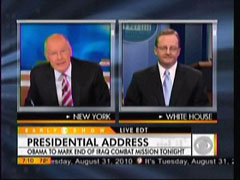
Read the rest here:
Five of Six Networks Press Unyielding Gibbs on Crediting Bush; White House Press Secretary Unleashes on Fox & Friends

